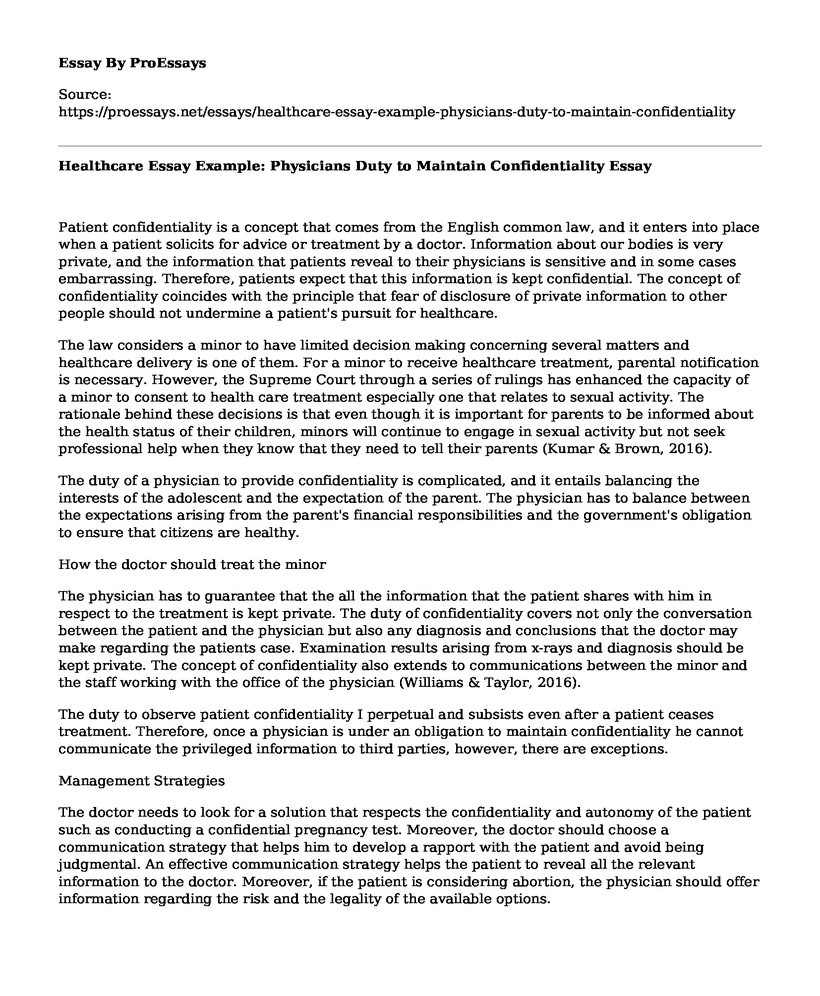Patient confidentiality is a concept that comes from the English common law, and it enters into place when a patient solicits for advice or treatment by a doctor. Information about our bodies is very private, and the information that patients reveal to their physicians is sensitive and in some cases embarrassing. Therefore, patients expect that this information is kept confidential. The concept of confidentiality coincides with the principle that fear of disclosure of private information to other people should not undermine a patient's pursuit for healthcare.
The law considers a minor to have limited decision making concerning several matters and healthcare delivery is one of them. For a minor to receive healthcare treatment, parental notification is necessary. However, the Supreme Court through a series of rulings has enhanced the capacity of a minor to consent to health care treatment especially one that relates to sexual activity. The rationale behind these decisions is that even though it is important for parents to be informed about the health status of their children, minors will continue to engage in sexual activity but not seek professional help when they know that they need to tell their parents (Kumar & Brown, 2016).
The duty of a physician to provide confidentiality is complicated, and it entails balancing the interests of the adolescent and the expectation of the parent. The physician has to balance between the expectations arising from the parent's financial responsibilities and the government's obligation to ensure that citizens are healthy.
How the doctor should treat the minor
The physician has to guarantee that the all the information that the patient shares with him in respect to the treatment is kept private. The duty of confidentiality covers not only the conversation between the patient and the physician but also any diagnosis and conclusions that the doctor may make regarding the patients case. Examination results arising from x-rays and diagnosis should be kept private. The concept of confidentiality also extends to communications between the minor and the staff working with the office of the physician (Williams & Taylor, 2016).
The duty to observe patient confidentiality I perpetual and subsists even after a patient ceases treatment. Therefore, once a physician is under an obligation to maintain confidentiality he cannot communicate the privileged information to third parties, however, there are exceptions.
Management Strategies
The doctor needs to look for a solution that respects the confidentiality and autonomy of the patient such as conducting a confidential pregnancy test. Moreover, the doctor should choose a communication strategy that helps him to develop a rapport with the patient and avoid being judgmental. An effective communication strategy helps the patient to reveal all the relevant information to the doctor. Moreover, if the patient is considering abortion, the physician should offer information regarding the risk and the legality of the available options.
References
Kumar, N., & Brown, J. D. (2016). Access Barriers to Long Acting Reversible Contraceptives for Adolescents. Journal of Adolescent Health.
Williams, R. L., & Taylor, J. F. (2016). Four steps to preserving adolescent confidentiality in an
Cite this page
Healthcare Essay Example: Physicians Duty to Maintain Confidentiality. (2021, Mar 29). Retrieved from https://proessays.net/essays/healthcare-essay-example-physicians-duty-to-maintain-confidentiality
If you are the original author of this essay and no longer wish to have it published on the ProEssays website, please click below to request its removal:
- Essay on Leadership in Emergency Preparedness Planning
- Malignant Transformation of Recurrent Nasopharyngeal Angiofibroma in Elderly Male: Case Study
- Bias in Family Nurse Practitioner (FNP) Paper Example
- Research Paper on Pain Management
- Essay Sample on Mass Media, Crime and Criminal Justice
- 2020: The Year Corona Virus Changed the World - Essay Sample
- Essay Sample on Emergency Response: Preparing Governments for Crisis







